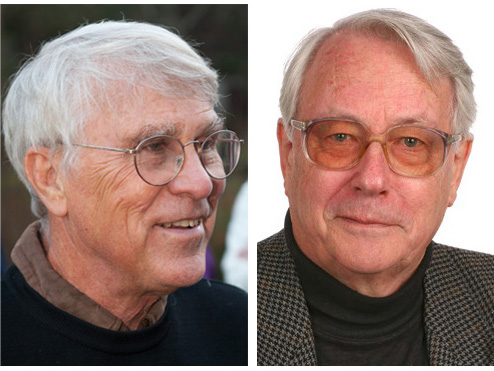What role does religion play in modernisation?
Two Hans Blumenberg Visiting Professors at the Cluster of Excellence “Religion and Politics”: sociologists Jóhann Páll Árnason and Mark Juergensmeyer – Lecture Series “Religion and War”, starting on 8 May about religion and modernisation
Press release of the Cluster of Excellence from 3 May 2018

The Cluster of Excellence “Religion and Politics” is looking forward to welcoming two Hans Blumenberg visiting professors in summer semester 2018: American sociologist and religious scholar Mark Juergensmeyer, who will present “Religion and War” in a public lecture series in Münster in June, and Iceland-born sociologist Jóhann Páll Árnason, who will give lectures, starting 8 May, on the role of religion in the process of modernisation. The Hans Blumenberg Visiting Professorship for Religion and Politics is named after the influential Münster philosopher Hans Blumenberg (1920–1996). It is to contribute to bringing innovative stimuli from international research to Münster and consolidating the interdisciplinary compatibility at the Cluster of Excellence. Renowned researchers from varying disciplines are appointed to professorship every semester.
The sociologist of religion Prof. Dr Detlef Pollack, speaker of the Cluster of Excellence, said that Jóhann Páll Árnason was one of the leading proponents of the comparative analysis of civilisations. “His publications in six different languages and his collaboration with sociology doyens such as Shmuel N. Eisenstadt prove him to be a scholar who is capable of connecting to the international discussions in many ways and who will enhance the research at the Cluster of Excellence.” Mark Juergensmeyer of the University of California, Santa Barbara, has presented important research on the topic of “religion and violence”, which is of great interest for the research focus of the same name in the Cluster of Excellence, according to Detlef Pollack. “We hope that the cooperation with both will provide valuable impetus for the continuation of our research.”
Lectures on “Secularisation, Disenchantment, Autonomy”
Sociologist Prof. Dr Jóhann Árnason, emeritus of La Trobe University in Melbourne, will address various approaches to a religious-political constitution of modernity, both in a public lecture series and in his research in Münster: Did the transition from pre-modern to modern societies become possible because the importance of religion decreased, or was the examination of religion the precise prerequisite for the path to modernity? The series will focus on various theories about the emergence of modernity, including approaches by Hans Blumenberg, after whom the Visiting Professorship is named, Max Weber, Shmuel Eisenstadt, Marcel Gauchet and Hans Joas.
The public lecture series of Jóhann Árnason is entitled “Säkularisation, Entzauberung, Autonomie: Zur Frage einer religiös-politischen Konstitution der Moderne” (Secularisation, Disenchantment, Autonomy: On the Question of a Religious-Political Constitution of Modernity). It will be held in German. On May 8, he will talk about “Hans Blumenberg and Carl Schmitt: Backgrounds and Horizons of a Dialogue”. The lecture will be held at 10.15 am in the Cluster of Excellence’s lecture theatre building, room JO 101, Johannisstraße 4 in Münster. On 14 May, an evening lecture at 6.15 pm in the same location is entitled “From Weber to Eisenstadt: Comparing Religion and Politics in Civilisation”. Two more lectures on 29 May and 5 June, respectively, both at 10.15 am, will discuss “Marcel Gauchet: Religion, Modernity and Democracy” and “Metamorphoses of the Sacred: Prolegomena Regarding an Analysis of Hans Joas”.
Lectures on “Religion and War”
In his first lecture on 12 June, sociologist Mark Juergensmeyer will deal with “The Odd Appeal of War”, asking why disasters are so often, almost naturally, followed by wars. On 18 June, the sociologist will talk about the mystical dimensions of war under the title “Cosmic War” and on 19 June, under the title “God at War”, about a lasting cultural attraction of religion and war. He will discuss whether and how religion can curtail conflicts. The lectures will be held from 6.15 to 7.45 pm in the lecture theatre building of the Cluster of Excellence, lecture theatre JO 101, Johannisstraße 4 in Münster.
Since 2016, previous Hans Blumenberg Visiting Professors were the Bochum historian Prof. Dr. Lucian Hölscher, the Würzburg legal scholar Prof. Dr. Horst Dreier, British sociologist of religion Prof. Dr Linda Woodhead and social and cultural anthropologist Prof. Dr Thomas Hauschild. (maz/sca/vvm)

